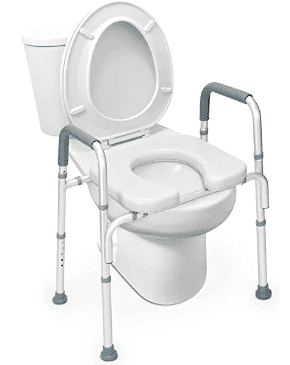Caregiver Strategies for Managing Incontinence in Dementia
As a caregiver to someone with dementia, incontinence can be one of the most challenging issues you are faced with.
Caring for a loved one who no longer has full control over their bladder or bowels requires patience and understanding, as well as proactive strategies to ensure both the patient’s physical needs and mental well-being are taken care of.
In this guide, we will discuss a range of solutions for managing incontinence in dementia patients so that caregivers can develop effective approaches to care.
Causes of Incontinence
Incontinence is a common problem in many older adults, both those with dementia and those with full cognitive function.
It can be caused by a variety of conditions such as:
- weakness of pelvic floor muscles
- chronic constipation
- pelvic organ prolapse
- overactive pelvic floor muscles
- dementia and other conditions that cause neurological dysfunction of the bowel or bladder
- common in dementia, Parkinson’s disease, and multiple sclerosis
All of the strategies covered here are safe and do not have any side effects. However, be sure to check with your loved one’s healthcare provider to be sure their incontinence does not have a medical cause outside of dementia.
Strategies for Managing Incontinence in Dementia
There is a range of strategies for supporting continence in people with dementia.
Here are my top 5 continence strategies for caregivers:
Continence Strategies for Caregivers
Now let’s take a deeper dive into each strategy.
Prompted Voiding
Prompted voiding is recommended to prevent urinary urgency, urge incontinence, and overflow incontinence.
Urinary urgency, also known as overactive bladder, can lead to falls due to rushing to the bathroom. It can also lead to leakage of urine if the person cannot get to the toilet, remove clothing, and get seated on the toilet quickly enough.
Overflow incontinence occurs when a person’s bladder becomes too full causing urine leakage.
The idea behind prompted voiding is to remind the dementia patient to use the toilet every 2-3 hours during the day to prevent incontinence symptoms.
Night-time toileting should only be performed as needed to avoid interrupting sleep.
Hydration Management
It might seem like making sure a dementia patient stays well hydrated could lead to more frequent urination and leaking. However, this is not the case.
In order to break this idea down, we need to understand a little about how the urinary system works. The kidneys produce urine continuously and drain it into the bladder for storage until it is full enough to alert the brain that we need to urinate.
Usually, the bladder must be about half full for the signal to be sent from the bladder to the brain. However, if we are dehydrated, our urine becomes very concentrated.
Urine is by nature acidic. The more concentrated it is, the more acidic it is. Highly acidic urine irritates the bladder causing urinary urgency and potential leakage.
So, in order to avoid urgency we must stay well hydrated. The best way to do this is to sip water or other fluids throughout the day. To learn more, read my post on hydration for dementia patients.
Bowel Management
Constipation can lead to bladder leaks. It may seem crazy, but the bladder and the rectum exist side by side in the pelvis. As neighbors, they can influence one another.
In addition, chronic constipation may cause the person to strain when having a bowel movement. Over time straining can weaken the pelvic floor muscles leading to urinary or fecal leakage.
Maintaining a healthy bowel is all about habits.
Managing constipation is a complete topic on its own. To learn more, see my post here on constipation management.
Healthy Bowel Habits
- Keep a regular time for having a bowel movement.
- Eat plenty of fruits and vegetables.
- Stay well hydrated.
- Make time to exercise each day.
- Use gentle abdominal massage to stimulate the bowel.
Use Visual Cues to Support Toileting
Visual cues can help individuals with dementia when verbal communication becomes more difficult. See my video below explaining how to use visual cues to support function for a person with dementia.
Visual cues are more acceptable than being told what to do, so using them can help the person with dementia feel more independent and calm.
A person with dementia may be confused and not sure of where the bathroom is located. Place a sign on the bathroom door to help them find it.
Leave the bathroom door open so they can see the toilet. This is a simple strategy that can help dementia patients find the toilet when they need it.
Rather than saying “it’s time to go to the bathroom”. Try saying “let’s go for a walk” and then when you pass the bathroom, say, “well here we are at the bathroom, let’s go ahead and try now”.
Simplify the Task
A person with dementia may have any number of barriers to toileting. Here are some common ones and how to overcome them.
Clothing Management
If the person has limited dexterity, it may be tough to unfasten buttons and zippers. Try adaptive clothing with velcro or an elastic waist.
Limited Mobility
Be sure the toilet is the proper height to make sitting and standing easy. If back, hip, or knee pain is present, using adaptive equipment such as a raised toilet seat or grab bars can make toileting easier and safer.

Physical Assistance
Help with hygiene if needed. Physical assistance might be necessary to help the person wipe and completely clean the perineum. Use gloves and moist, fragrance-free wipes to make the process easier and more hygienic.
Prevalence of incontinence in dementia patients.
Incontinence is a common problem among dementia patients. It can affect bowel movements or bladder control, and often coincides with the moderate to severe stages of the disease.
According to recent research, 11-93% of dementia patients experience urinary incontinence. Urinary incontinence is defined as any amount of involuntary leakage of urine.
Incontinence makes caregiving much more difficult. Caregivers are often overwhelmed with other caregiving tasks.
The person with dementia may feel ashamed and guilty as they realize they no longer have control over basic bodily functions. This can lead to agitation, frustration, and lashing out at caregivers.
Causes of Incontinence in Dementia
There are a number of reasons why incontinence occurs in dementia patients. One is that as the disease progresses, they may have difficulty communicating their need to go to the bathroom.
They may also forget how to use the toilet, or be unable to get up and walk to the bathroom independently.
In the middle and late stages of dementia, the area of the brain that senses the urge to urinate or defecate may be affected. In this case, the person with dementia may not realize they need to go.
It is important for caregivers to understand that incontinence is often a side effect of dementia and not intentional behavior on the part of the patient.
Patients usually cannot control their bladder or bowel movements, and should not be punished or scolded for accidents. Patience and understanding are essential when caring for someone with incontinence so as not to make the person feel guilty.
Seek help from a healthcare professional
Incontinence is a problem that can be extremely embarrassing for those who suffer from it. However, it is important to remember that you are not alone and there is help available to reduce incontinence episodes.
If your loved one with dementia is experiencing problems with incontinence, please do not hesitate to seek assistance from health professionals, like a pelvic floor therapist, urologist, or primary care physician.
Certain medications can cause incontinence. There may also be other medical causes besides cognitive issues that are to blame for incontinence. It is always best to get it checked out by a physician.
There may be treatments available that can help improve bowel and bladder control for the person with dementia.
But remember, loss of bowel and bladder control is very common as dementia progresses. So finding ways to manage incontinence will be helpful in the long run.
Conclusion
Dementia affects more than 47 million people worldwide and the numbers are rising.
Incontinence is a common symptom of dementia, with up to 60% of patients experiencing urinary incontinence and 40% experiencing fecal incontinence at some point during their illness.
If you are caring for someone with dementia who is struggling with incontinence, there are several things you can do to manage the problem.
First, try to identify any possible triggers that may be causing accidents, such as drinking too much fluid at night or medication side effects.
Implementing a toileting schedule can also help reduce accidents by prompting the person to use the restroom regularly throughout the day.
Adopt healthy bowel habits to minimize constipation which may be a contributing factor to urinary incontinence.
Have the person drink plenty of fluids during the day to maintain good hydration. But also manage fluid intake in the evening to prevent nighttime leaking.
Use visual cues to help the person find the toilet. And be sure to simplify the task by providing adaptive equipment or clothing to support a person with physical disabilities with toileting.
Lastly, continence products such as incontinence pads and adult briefs can help protect against leaks and skin irritation when accidents occur.
Using waterproof mattress covers or furniture covers may be helpful if it is not possible to avoid accidents.
Don’t hesitate to reach out to a healthcare professional for help. Even though incontinence is a common symptom of dementia, there may be other medical causes that can be easily treated.






